Managing Disruptive Employee Behaviors Workshop
Managing Disruptive Employee Behaviors Workshop
The Challenge
Negative behaviors are often hard to isolate, difficult to prove and uncomfortable to address. Often, the hardest part of a manager’s job is talking with employees about performance related issues. Nearly all supervisors dread initiating these kinds of conversations, and many avoid them whenever possible. This inherent avoidance causes performance issues to worsen over time.
Frequently, the areas that require improvement relate to behaviors that are difficult to quantify, such as interpersonal skills, personality traits, motivation and attitude. Consequently the manager’s perceptions can seem subjective rather than objective. So discussing these issues with an employee can seem out of the question. The underlying problem is the inability to translate what is "known" into effective words that are easier to say and positively effect the employee.
A New Approach
The Performance Continuum Feedback Method® (PCFM) bypasses the need to raise negative performance examples, thus representing a healthy departure from the established feedback approach known as "constructive" criticism. Alleviating defensive reactions enables managers and employees to come to terms more quickly around developmental solutions and goals.
Even with the best of intentions, constructive criticism usually feels confrontational. Not surprisingly, it typically elicits defense reactions from most employees. Utilizing the PCFM, performance messages come across as non-threatening so the feedback recipient is much more likely to remain open to listening to the information, as opposed to engaging in a confrontational exchange with the person delivering the message.
What Participants Can Expect During This Action Learning Session
Through this experiential program feedback providers will gain new skills to assess performance, create the right talking points and manage the resulting discussion.
DIAGNOSE PERFORMANCE ISSUES
- Accurately and quickly assess the overall employee performancelevels of your entire team.
- Identify high potential employees and those in need of performance support.
- Uncover key performance information and set aside extraneous information.
CRAFT THE PERFORMANCE MESSAGE
- Learn to think and talk in terms of the desired performance as opposed to creating messages based on calling attention to performance deficiencies.
- Find the right words to describe behavioral aspects of performance such as interpersonal skills, temperament, attitude, motivation etc.
- Depersonalize tough messages by positioning the information alongside the businessrationale for change.
- Address performance issues in a non-critical tone and avoid the number one trap that most managers fall into.
- Turn real-life, challenging performance scenarios (including participant examples) into constructive, accurate and honest messages.
- Learn the types of phrases and words to avoid.
MANAGE PERFORMANCE DISCUSSIONS
-
Present feedback in a manner that minimizes awkwardness and defensiveness.
-
Demonstrate support of the employee while at the same time making it clear that the employee is ultimately responsible for attaining performance objectives.
-
Anticipate and respond effectively to employee reactions to feedback, including typical objections.
-
Maintain control over the discussion's direction and outcome.
-
Conclude performance discussions by assessing and confirming the employee's willingness to take responsibility for the area(s) of development.
-
Follow up to verbal agreements for change by translating feedback into written goals- even for difficult to measure behavioral type issues.
Tools Attendees Will Take Away
- The PCFM tool and Participant Workbook and job aids.
- Creation and practice of at least one actual performance message.
- A time saving performance feedback tool that can be used right away.
- The ability to communicate performance feedback that has a greater chance for a "you're right, I do need to work on this" employee response instead of a defensive reaction.
Who should attend?
Feedback providers such as managers, supervisors, team leaders and HR professionals


